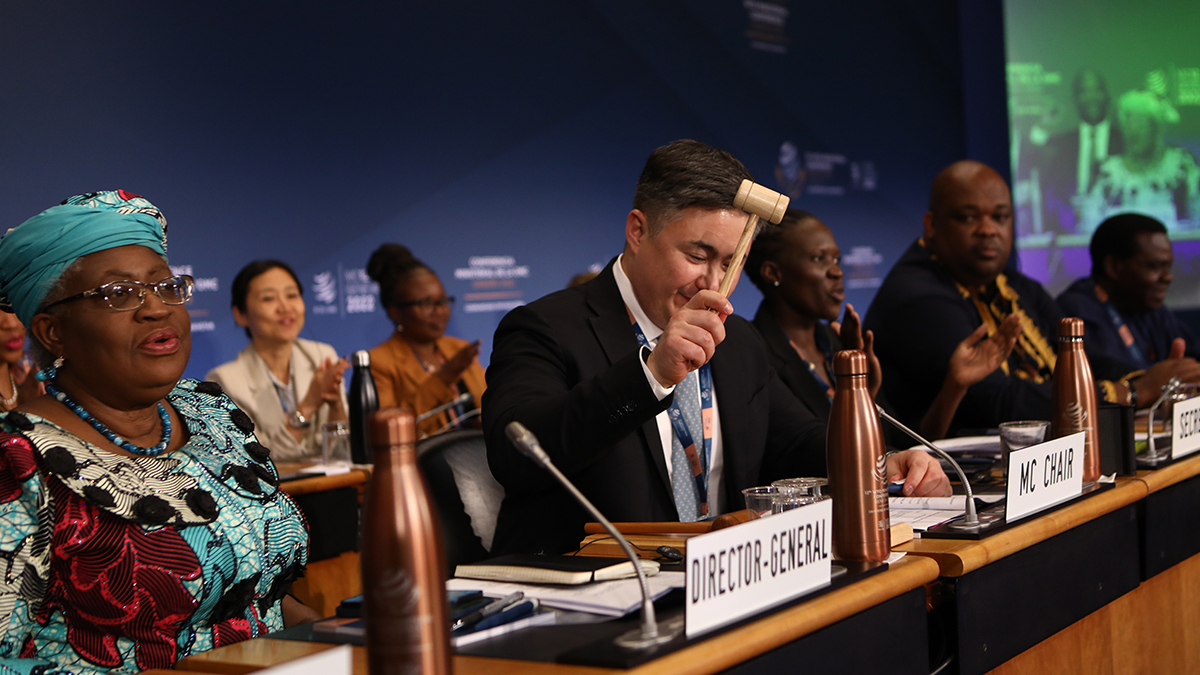Over 100 top trade officials gathered in Geneva on June 12-17 to participate in the 12th Ministerial Conference (MC12) of the World Trade Organization (WTO). Even as multilateralism was already under stress when ministers last met in 2017, things have gotten more complicated since then. A series of overlapping and compounding crises provided the backdrop for the discussions: a pandemic, war, supply chain disruptions, a looming food crisis, rising inflation, deepening geopolitical rifts and climate change. Against all odds, however, MC12 delivered. Concrete and tangible results confirm that multilateral trade cooperation can respond to the challenges of today’s world and help governments tackle global emergencies, even in the most difficult times. It also hinted at what the WTO of the future could look like, perhaps the most relevant outcome. But MC12 also exposed critical challenges to leveraging the full potential of the multilateral trading system for sustainable and inclusive growth.

WTO ministerial conferences are unpredictable events, which usually take a life of their own. When trade ministers from across the world come together to negotiate a set of complex and sensitive issues in just a few days, no one can really anticipate what will happen. There has been great success, like in Bali in 2013 when ministers adopted the landmark Trade Facilitation Agreement; there has also been massive failure, like in Seattle in 1999 when the organizers pulled the plug even before the conference end date. The last meeting of the WTO’s main decision-making body, in Buenos Aires, did not result in any multilateral outcome.
In the case of MC12, expectations were low, but the stakes were high. Success, even if modest, was critical. Failure to deliver would have been devastating on several counts. It would have been a missed opportunity for governments to use trade collaboration to tackle the pandemic, the food crisis or the depletion of fish stocks. Failure to extend the moratorium on the imposition of customs duties on electronic transmissions would have been a setback for the continued expansion of the digital economy and the growing number of small and medium businesses and consumers in both advanced and developing economies that rely on it. Without the appetite to collaborate, governments would have dealt a blow to the prospects of WTO reform and with it, to the future of the organization. Fortunately, ministers opted for success. Much credit goes to WTO’s Director-General Dr. Ngozi Okonjo-Iweala, who worked tirelessly to prevent members from choosing the alternative.
The Ministerial’s formal outcomes pertain to central issues in today’s world. To address the pandemic, the most important -and contentious- part clarifies and streamlines the scope for governments to limit patent rights to support the geographic diversification of vaccine production capacity. To fight food insecurity, members agreed to encourage trade and exempt the World Food Program’s food purchases from export curbs. On digital trade, members committed not to impose customs duties so that video streaming, financial transmissions and other electronic transmissions can continue to flow freely across borders. And for the first time in the history of the WTO, members reached an agreement that puts environmental sustainability at its core, in this case to prohibit subsidies for illegal, unreported and unregulated fishing operations and overfished stocks, as well as a transparency framework for sharing information.
In preparing the way forward, ministers committed to work towards the reform of the WTO, to improve all its functions. This is critical. They agreed a process anchored in the organization’s structure, with flexibility, and a mandate to report on progress before the next ministerial conference. Moreover, they acknowledged the importance and urgency of addressing the challenges and concerns with respect to the dispute settlement system, including those related to the Appellate Body, with the view to have a fully- and well-functioning dispute settlement system by 2024.
An inconspicuous footnote in the intellectual property decision may be the most important systemic contribution of MC12. In defining which countries could benefit from the flexibilities included in the deal, footnote 1 provides a pragmatic blueprint to support the increased adoption of responsibilities by emerging markets in the system. It declares that all developing countries are eligible and encourages those with existing capacity to manufacture COVID-19 vaccines to make a binding commitment to opt out of the decision. China did. Those obligations may be adopted in the General Council and will be recorded, compiled and published in the WTO website. Footnote 1 was negotiated jointly by the United States and China. Unsurprisingly, it was the last piece of MC12 to fall into place. Beyond helping to balance responsibilities within the WTO, the “opting out” technique could facilitate multilateral outcomes by allowing those members that cannot join to stay out, bringing much needed flexibility to the trading system.
For all its merits, MC12 revealed members remain far apart on many issues, including agriculture where a breakthrough on a future work program was elusive. Divergent views on the role of trade for growth and development, and on the benefits of trade cooperation were also at play. MC12 is a positive step, to be sure. But it is only a first step in a broader process to revitalize the WTO and rebuild trust, a road which will continue to be bumpy, rocky and unpredictable. What I witnessed last week, however, fills me with hope that, as Dr. Ngozi said during the closing session, “strategic competition will be able to exist alongside growing strategic cooperation”. The work goes on.
Reach us to explore global export and import deals